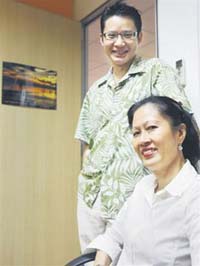When Gueh How Kiap revealed his dream of becoming an inventor to his mother, the response he received was: “Don’t have unrealistic dreams. In America, maybe, but how can you become an inventor in Singapore?”
 |
|
Kiap and his mother – Photo: New Paper |
Ann Tong, Kiap’s mother, had valid reasons to worry about her son’s potential. As a child, he had suffered from high fevers, and she feared he might be at risk for polio. Fortunately, Kiap grew up healthy, but his mother’s words haunted him for a long time afterward. Kiap did not believe that one could not become an inventor in Singapore.
He showcased his first invention while still a student at Delta Secondary School. After watching a documentary about visually impaired individuals in England, Kiap conceived the idea of creating a cane for the visually impaired that could illuminate in foggy conditions. This invention earned him two awards: Young Designer and Young Inventor in 1992. Shortly after, a design company from the United States approached him and offered a large sum of money to incorporate the lighting technology into their line of sports shoes. “I was really excited about that offer and realized my career path for the future: to become a true inventor,” he said.
From an average student who had never attended prestigious schools and graduated only from Singapore Polytechnic, this 29-year-old has become the owner of 29 patents. He has also never worked for any companies like his friends, yet he remains confident about his stable financial situation.
Kiap’s registered inventions at the Intellectual Property Office of Singapore are quite diverse, including products for daily life such as adjustable heels for women to change their height while wearing shoes, a salt filtration system, and a method to process and store freshwater from seawater, which he named “Water Music.”
With this initiative, vessels can convert seawater into freshwater for use during maritime journeys. Kiap has received an investment of $2.7 million for his “Water Music” system, funded by investors. He hopes that his invention will benefit people living in arid regions and help address global water issues.
Another one of Kiap’s inventions is a data security program called “System and Method for Transactions,” designed to protect confidential information (such as PIN codes) from being stolen online. This invention won him a special prize in a competition organized by the Korean Business Association (Kova) in 2004.
Kiap shares that for most inventions, it only costs about $160 to register a patent, but the effort and money invested to create that invention are sometimes priceless. The joy of creating useful products for life has given Kiap the confidence to continue pursuing his passion.
THANH TRUC


















































